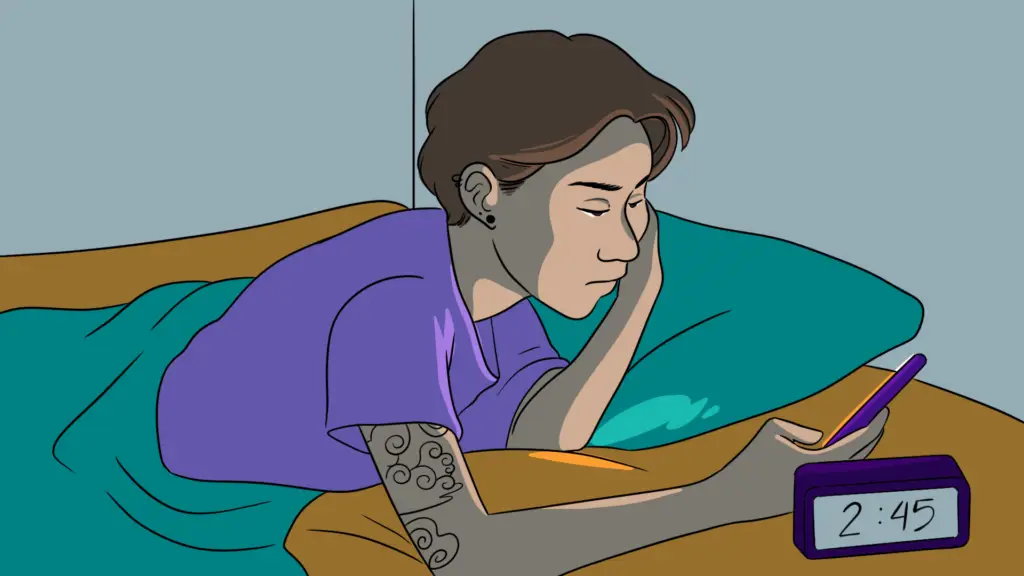Struggling with insomnia can be a frustrating experience, affecting both physical and mental health. Sleep is a crucial component of overall health and well-being. However, for some, a condition known as insomnia can disrupt this essential aspect of life. Insomnia is a sleep disorder characterized by difficulty falling asleep, staying asleep, or waking up too early and not being able to fall back asleep. It can have an impact on hormone health, affecting the body’s ability to regulate hormones effectively. In this blog post, we will explore the relationship between sleep and hormone health, the effects of insomnia, and the unique challenges faced by the transgender and nonbinary community when it comes to managing this condition. We will also discuss insomnia medication and other treatment options – such as those offered at Plume – to help individuals improve their sleep health.
Table of Contents
The Connection Between Insomnia and the Transgender Community
In the transgender community, the occurrence of sleep difficulties, such as insomnia, is notably higher compared to the general population. Several factors contribute to this disparity, including heightened levels of stress, anxiety, and depression, which are often more prevalent among transgender individuals.
A study found that a large number, about 80%, of transgender individuals—both transgender men and women—reported having trouble sleeping. This rate is higher than what’s typically seen in the general population.

Good sleep is important for overall health, and not getting enough can make people sick or even shorten their lives. Even though researchers thought that things like chronic pain or mental health concerns might be causing sleep problems, they found that these factors didn’t fully explain why transgender folks were having trouble sleeping.
Some hypotheses suggest taking prescription hormones could contribute to sleep trouble, but the study didn’t find strong evidence for this. However, it is important to note that hormones like estrogen and testosterone can affect how we sleep.
There’s also a hormone called progesterone, which can help people fall asleep. However, it’s not clear how its absence in transgender men might contribute to their sleep difficulties. Interestingly, the study also looked at something called sleep-disordered breathing, like obstructive sleep apnea syndrome (OSAS), which can happen when breathing repeatedly stops and starts during sleep. It’s often seen in people taking testosterone, but the study didn’t check for it in all participants.
In another study that looked at differences in sleep patterns among gender minorities, those who identified as gender nonbinary had the highest rates of very short sleep—meaning they slept less than 5 hours a night. Specifically, 35.5% of transgender nonbinary participants reported this short sleep duration. This was higher compared to other groups in the study, like lesbian, gay, bisexual, transgender (LGBT) individuals overall, where 17.3% reported short sleep, and cisgender straight individuals, where only 12.2% reported short sleep.
In simpler terms, the study found that gender nonbinary people were more likely to have very short sleep compared to other groups surveyed. This suggests that there may be specific sleep challenges that affect gender nonbinary individuals, and understanding these differences could help tailor better sleep support for this community.
Gender-Affirming Hormone Therapy (GAHT) and its Effects on Sleep
While the effects of gender-affirming hormone therapy (GAHT) on sleep are unknown, sex hormones can affect insomnia and sleep quality. Hormones like estrogen and testosterone have far-reaching effects on the body, including on the brain areas that regulate sleep. Estrogen can influence sleep quality and may lead to vivid dreams or changes in REM sleep. On the other hand, testosterone can affect sleep patterns differently, potentially leading to sleep apnea or disturbed sleep. It’s also possible for the emotional and psychological journey of transitioning to impact sleep, as changes in mood and stress levels can alter sleep quality.
For those experiencing changes in sleep while on GAHT, it’s crucial to communicate openly with your healthcare provider. They can offer insights into how hormone levels and other factors may be influencing sleep and suggest adjustments to treatment plans if necessary. Monitoring hormone levels, adjusting dosages, or even exploring sleep aids are potential strategies to mitigate sleep disruptions.

Solutions for insomnia
When tackling insomnia, medication can be a component of a comprehensive treatment plan. Medications to address insomnia work in various ways, depending on the individual’s unique needs and the specific challenges they face in achieving restful sleep. Some medications aid in falling asleep more quickly, while others help in maintaining sleep throughout the night. It’s important to note that medication is often most effective when combined with healthy sleep habits and possibly other treatments recommended by your healthcare provider.
Additionally, because everyone’s body reacts differently to medication, what works for one person might not work for another.
This means that finding the right medication can sometimes require patience and adjustments. Your healthcare provider can guide you through this process, making changes as needed to find the most effective solution for your insomnia.
It is also important to understand that sleep disorders are often multifactorial—this means many things come together to make sleeping difficult. Working on good sleep hygiene (see wellness tips below) is often equally as important as medication.
Some insomnia medications that can be used alongside gender-affirming hormone therapy are doxepin, mirtazapine, trazodone, ramelteon, and diphenhydramine. Plume does not prescribe medications such as eszopiclone (Lunesta), zolpidem (Ambien), or any benzodiazepine class medications.
Wellness Tips for Managing Insomnia
Strategies to help you build a healthier sleep routine that supports your well-being can include the following:
Establish a Consistent Sleep Schedule: Try to go to bed and wake up at the same time every day, even on weekends. This helps regulate your body’s internal clock.
Create a Relaxing Bedtime Routine: Before bed, engage in calming activities such as reading, taking a warm bath, or practicing relaxation exercises like deep breathing or meditation. Avoid stimulating activities like watching TV or using electronic devices with bright screens.
Create a Comfortable Sleep Environment: Keep your bedroom dark, quiet, and cool to promote sleep. Invest in a comfortable mattress and pillows, and consider using blackout curtains or white noise machines if needed.
Limit Exposure to Screens Before Bed: can interfere with your body’s natural sleep-wake cycle. Try to avoid using electronic devices at least an hour before bedtime, or use apps or settings that reduce blue light exposure.
Watch Your Diet and Avoid Stimulants: Avoid consuming caffeine, nicotine, and heavy meals close to bedtime, as they can disrupt sleep. Instead, opt for light snacks if you’re hungry before bed, and consider herbal teas like chamomile or valerian root, which may promote relaxation.
Stay Active During the Day: Engage in regular physical activity, but try to avoid vigorous exercise close to bedtime. Exercise can help improve sleep quality and promote relaxation, but doing it too close to bedtime may make it harder to fall asleep.
Manage Stress and Anxiety: Practice stress-reduction techniques such as mindfulness, yoga, or progressive muscle relaxation to help calm your mind before bed. Consider keeping a journal to jot down any worries or thoughts that might be keeping you awake.
Limit Naps: While short naps can be refreshing, long or irregular napping during the day can interfere with nighttime sleep. If you need to nap, try to keep it short (20-30 minutes) and avoid napping late in the day.
Limit Alcohol and Caffeine Intake: Both alcohol and caffeine can disrupt sleep patterns, so it’s best to limit consumption, especially in the hours leading up to bedtime.
Addressing insomnia is crucial for overall well-being, particularly within our transgender and nonbinary community. Whether exploring medication options such as those provided by Plume or implementing lifestyle changes to improve sleep quality, you can take steps towards better management of this condition. By seeking guidance from trans-inclusive healthcare professionals and adopting healthy sleep habits, you can work towards achieving a more balanced and rejuvenating sleep pattern, ultimately supporting your overall health and quality of life.



